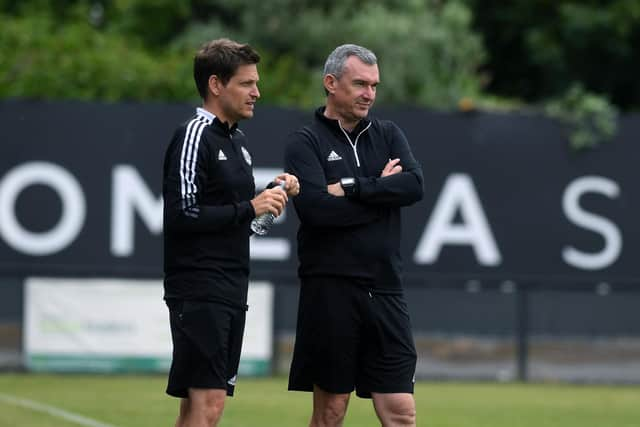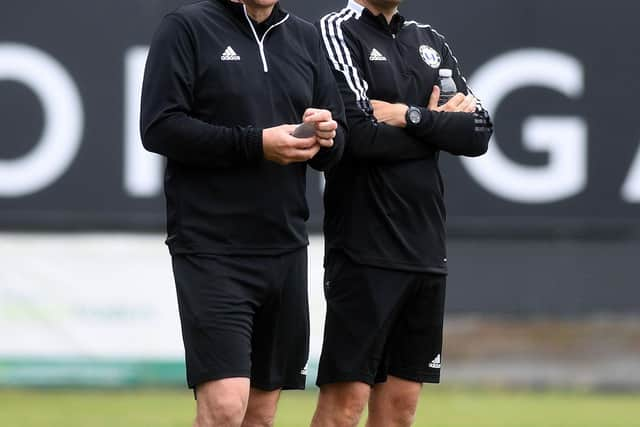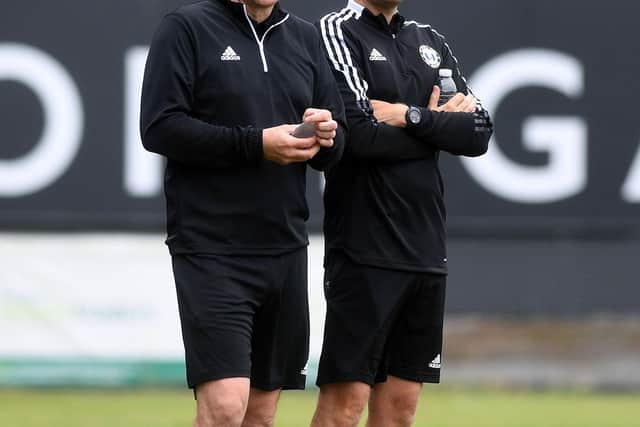"I thought it was the right time with the right people" - Andy Cooper on Hull, Halifax and working across the globe in between
and live on Freeview channel 276
FC Halifax Town's assistant manager brings a wealth of coaching knowledge and experience with him to The Shay, having worked in different roles, in different countries and with different age groups.
Cooper is Hull born and bred, growing up as a Tigers fan and can name the date and opposition when he was a mascot at Boothferry Park.
"28 November, 1992, Blackpool."


Advertisement
Hide AdAdvertisement
Hide AdThe 40-year-old was on Hull's books as a young player, but it wasn't long before coaching eclipsed playing as his ambition.
"It was limited," Cooper says of his playing career. "I played throughout youth and county level and then club football but I knew from an early age I wasn't ever going to be at the level to play full-time of professionally, so I chose a completely different path.
"I started coaching young, I was helping out in my later teens in terms of coaching and training so I got the bug early.
"I did my first qualification when I was 19.


"I felt I could affect things more by coaching than by playing. My passion was in teaching, education and coaching rather than playing.
Advertisement
Hide AdAdvertisement
Hide Ad"I went over to play in Australia for a bit but more for life experience really and to use that as opposed to it being a fundamental part of my career."
Cooper moved to Australia aged 20, staying there for two years.
"I really enjoyed it," he said, "balancing playing and coaching, but I felt a calling to come back and finish my coaching licences."


Cooper has a UEFA A Licence, an FA Advanced Youth Award and a professional diploma in leadership in sport.
Advertisement
Hide AdAdvertisement
Hide AdAfter a year back in the UK, he moved to Qatar in 2007 and spent a career-defining decade there at the Aspire academy, the national academy funded by the Qatar royal family and supported by the Qatar Football Association, with the aim of developing a squad capable of performing at this year's World Cup.
"I was working in partnership with clubs like Bolton Wanderers and Everton in Australia, and part of the set-up was we'd send lads over if they were at the required level," Cooper said.
"One of the coaches moved on to Everton, who was my mentor in my coaching. He then was headhunted after going to Qatar's national academy with one of Everton's youth teams.
"He recommended me to go over to Qatar for an interview. They relocated to Germany during the hot months, which is where my interview was.
Advertisement
Hide AdAdvertisement
Hide Ad"I initially worked with the u10s and u11s on arrival, but my ten-year journey saw me progressing up the age groups to work up to coaching the u15, 16 and u19 Qatar national sides.
"I had the most amazing coaching journey, who I coached alongside, who I coached under, the experiences, daily training in a world-class environment, the tournaments we went to.
"It was the best place for me to be a sponge and absorb these methodologies and ideas, which I don't think I would have got here in England.
"I worked under three different technical directors, it was brilliant."
Advertisement
Hide AdAdvertisement
Hide AdDuring Cooper's time in Qatar, the country's youth team became Asian champions, while the national side became champions of Asia.
"The expectation from within was massive," he said, "and you knew you could be part of something special. You were working with these local lads every day, seven sessions a week, and then you'd fly in the best opposition going.
"Two teams would come every week, under 12s, under 14s, one week it might be Bayern Munich, the next it might be Real Madrid.
"You'd see different styles of play different systems, you'd meet the coaches and expand your network of contacts.
Advertisement
Hide AdAdvertisement
Hide Ad"It was quite humbling as a young lad from Yorkshire to get this chance.
"Some of the coaches have gone on to great things, there's a head coach in the MLS, Paul Nevin is one of the backroom staff with England and first-team coach at West Ham.
"There are sports science guys at major clubs, a lot of people have used it as a springboard."
Cooper then joined Leeds United in 2017, heading up their under 13s to under 16s programme.
Advertisement
Hide AdAdvertisement
Hide AdPartway through his time at the club, Cooper stepped up to take charge of their under 23s alongside former Halifax player and current Huddersfield boss Danny Schofield.
"I did a pre-season with Bielsa," he said, "which was absolutely fascinating, how he operated."
Cooper's former technical director in Qatar, who was setting up a club in India, then invited him to be academy director for the team, Punjab FC.
"I was only there for four months because of Covid, so did the job remotely for a year," Coper said.
Advertisement
Hide AdAdvertisement
Hide Ad"We had multinational staff, some who had worked for Aspire (in Qatar), Curtis Fleming, who is now assistant manager at Bristol City, Damian Matthew who is now assistant coach at QPR.
"The circumstances were just unfortunate in terms of restricted travel and red list countries, and in the end, it was a case of family first and it was best to part ways.
"It was a good experience though, developing players and staff for a first-team, working with a football director and then academy staff and putting a programme in place for 125 kids."
There then followed a consultancy role supporting Bradford Park Avenue in their academy restructure.
Advertisement
Hide AdAdvertisement
Hide AdBut Cooper was keen to return to first-team football, if he could find the right environment.
"It needed to be somewhere I could use my experience of developing young players, but mix that with working for three points on a weekend, and with a management team who has the same values of how we want to play and train," he said.
"When the opportunity came to speak with Milly about getting involved (at Halifax), I already knew what they'd done in the last few years through Sarg (Joe Sargison, first-team coach), I'd watched games.
"I thought it was the right time with the right people. First-team football is something I've always wanted to do when the time was right at the right place."
Advertisement
Hide AdAdvertisement
Hide AdThere was no settling in period for the new assistant boss, who was appointed amid an extremely busy pre-season.
"I started when there were players moving on and heavy recruitment coming in, so straight away on the first day I was looking at clips of players who might come in," he said.
"The first day of pre-season we had triallists, so making decisions on players with Milly was great for getting our relationship going in terms of what we value and what we want to see.
"The club have been great in terms of a family feel and welcoming me, making you feel part of something.
Advertisement
Hide AdAdvertisement
Hide Ad"The staff had a real honest assessment of last season and felt we could have gone further, they felt we're not a smaller club that's overachieved.
"We've got some really good players, some young players and some experienced pros that add value, and make a really good dynamic.
"I saw that on the training pitch straight away, the level of training and the intensity, the detail the lads have, the standards they maintain has been really good, and we want to convert that into performances and results.
"The bar that's been set by previous seasons is really high and I had to come in on day one and get straight out on to the pitch and get working with players.
Advertisement
Hide AdAdvertisement
Hide Ad"You don't get time to adjust or adapt in this kind of environment in football, so there's a lot of research at home, watching opposition, watching games, I watched a lot of the games back from last season, to get my initial impression but nothing's better than getting on the grass with players and knowing what they're really like.
"That's where you can form your relationships."
Cooper's is a multi-faceted role, acting as sounding board to manager Chris Millington as well as sharing the workload.
"With Milly stepping up to be manager, he knows the role and he has a relationship with the players as the assistant," Cooper said.
"He's transferred that to being the manager over pre-season, so I know he has a really good personal relationship with the players.
Advertisement
Hide AdAdvertisement
Hide Ad"But there are certain things I need to protect him from to make sure he has a clear mind and can make his decisions with clarity and without the stresses that come with the job, and that's where I step in and take some of the heat by speaking to the players about whatever area of the game it is or whatever's going on.
"In terms of working with him, you can't challenge him for the sake of it, it has to be valid and if he asks your opinion, you have to be brutally honest. That's what we've been developing with regards to team selection, how we're training.
"The final word is with the manager in terms of how the session looks, the detail and what he wants, and then we have a really clear process of reflecting on games, reflecting on training, that's open and brutal.
"We have a healthy reflection period where you can be challenged and tested, and the reasons for taking the actions you did are challenged, rather than just saying yes to everything and 'you're doing great'.
Advertisement
Hide AdAdvertisement
Hide Ad"Ultimately he makes the final call, but in team shape, opposition line-up and scouting is where I think I can be helpful for him and so far we've worked on a plan of that where we look at the opposition, how they'll play and their threats, but we focus on us.
"It's a really good relationship that's developing and he's brilliant for me because he's done the role before."
Cooper says he and Millington share similar values and principles when it comes to what they want from the team.
"First and foremost it comes from the manager and you feed off him," he said.
Advertisement
Hide AdAdvertisement
Hide Ad"So when you're discussing how he wants his team to play and how we're going to set-up, it matched up with me in terms of people, being a people person, they're humans first, we get to know them.
"We've met every player individually, I've got to know them, areas they want to develop, their background, so I've looked at old games, because I want to get to know them so we can get the best out of them and not just go through the routine of daily training.
"Ultimately we want to get the ball down and play, have possession, sustain attacks and be able to not just keep it for keeping its sake, but be able to threaten.
"The key thing for me, and Milly and I have spoken about this a lot, I love a team that, when we lose, we get that pressure on the ball, and when teams have to go long, you try and stop it at source.
Advertisement
Hide AdAdvertisement
Hide Ad"We want to be at the opposition quickly, that's what I like and I know that's driven from the manager as well."
For Cooper, the end result of all the training, all the analysis and all the preparation has to be a team with a clear identity based around a forward-thinking team.
"I can be so heavy on opposition analysis, working with the backroom staff, but that has to be filtered to it being more about us than them," he said.
"I need to know elements of the opposition's game, if a player comes in and asks me a question about a wing-back, what foot he uses, we need to know.
Advertisement
Hide AdAdvertisement
Hide Ad"But the messages are really shortened, it's simple for the players and then if they need to know extra or see clips, we've got it.
"That's how we operate.
"What we want to see is a forward passing team, we break lines with possession, we're purposeful in what we do, purposeful when we don't have it in regaining it, and when we do have it, which means if we can get forward and get in-behind, we'll do it, we won't be too proud not to.
"But if we can play, drop a team low and move the ball using technical players and energy, we will.
"It's not fixed, it's an identity, a style, but it depends on the opposition and the systems.
"We change systems in games, it's more about our principles and our basics, we want brilliant basics all the time, that's the message every day in training."